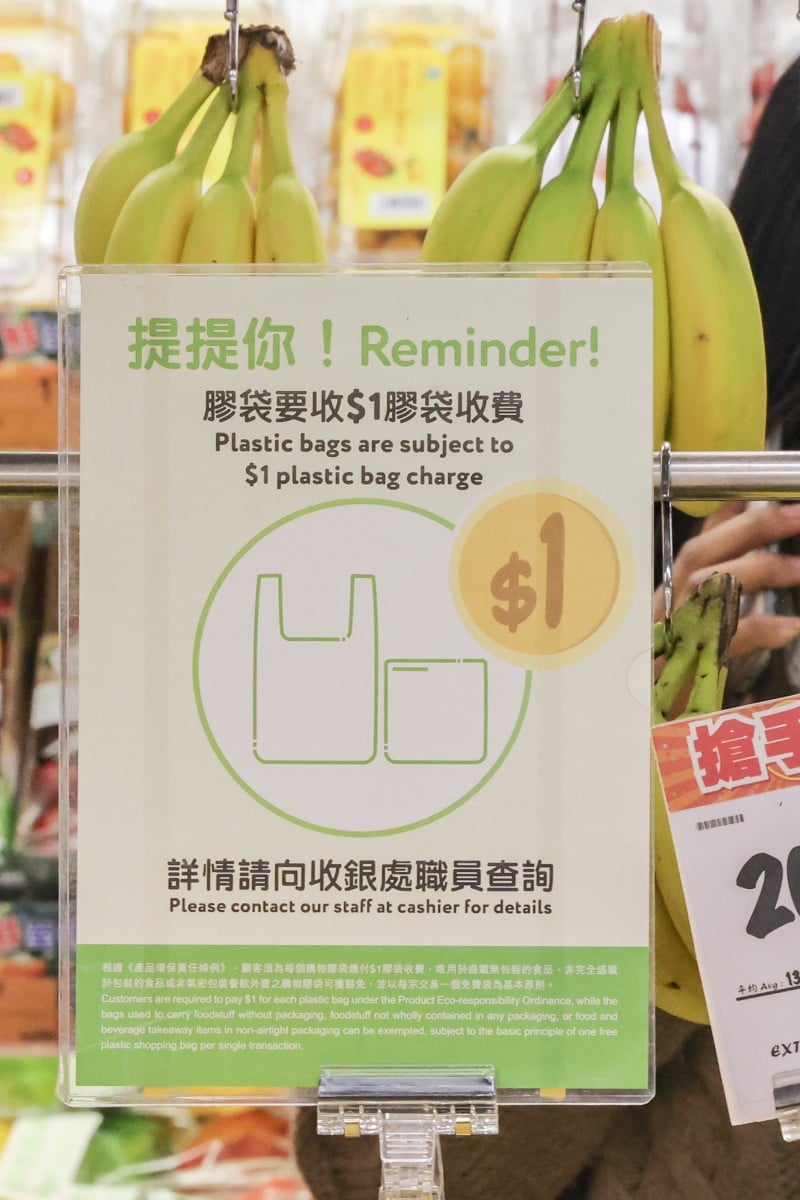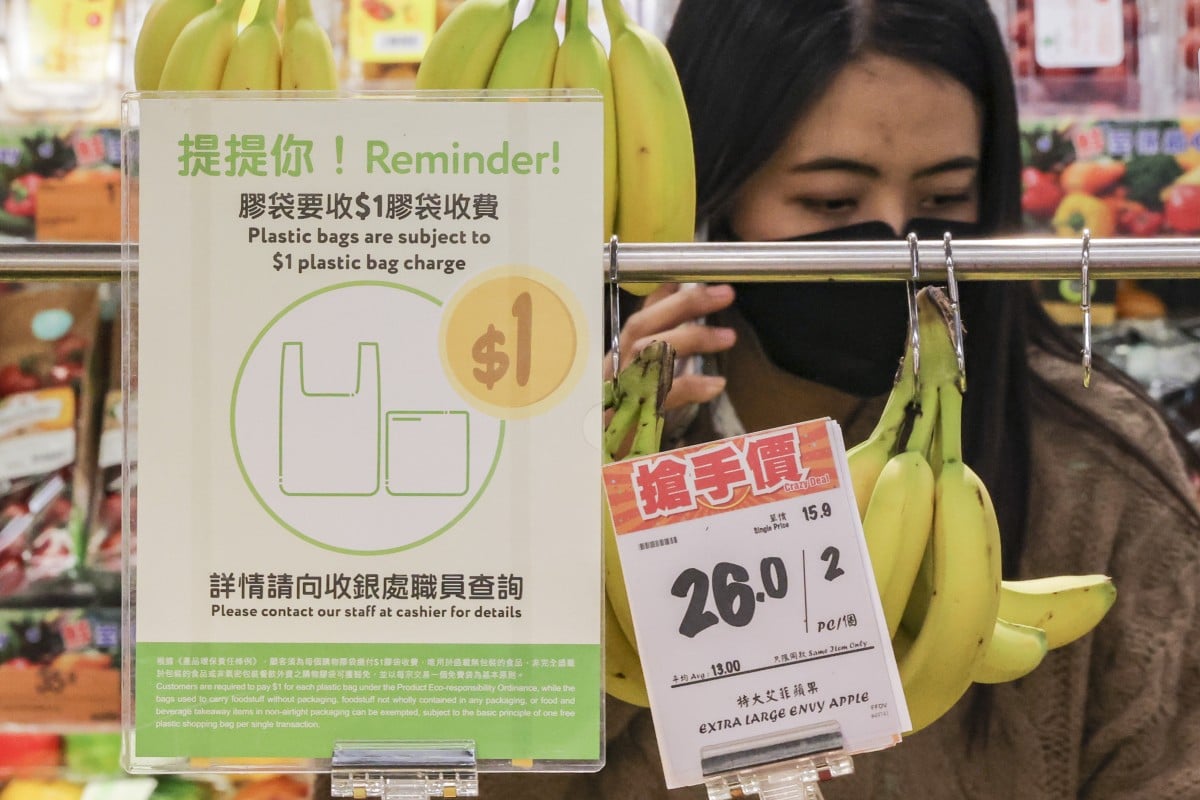
Face Off: Is the HK$1 plastic bag fee an effective way to reduce waste in Hong Kong?
- Each week, two of our readers debate a hot topic in a showdown that doesn’t necessarily reflect their personal viewpoints
- This week, they discuss whether doubling the levy on plastic bags will be a good tool towards fighting plastic pollution in Hong Kong
 The fee for plastic bags increased from 50 HK cents to HK$1 for each plastic bag at Hong Kong supermarkets on December 31, 2022, the first increase in 13 years. Photo: Jelly Tse
The fee for plastic bags increased from 50 HK cents to HK$1 for each plastic bag at Hong Kong supermarkets on December 31, 2022, the first increase in 13 years. Photo: Jelly TseIf you are interested in joining future Face Off debates, fill out this form to submit your application.
For: Rhea Saxena, 16, King George V School
The Hong Kong government’s new HK$1 levy on all types of plastic bags, an increase from the previous 50 HK cent fee, will help combat plastic waste and encourage consumers to use reusable bags.
Since the 50 HK cent plastic bag fee was launched in 2009, polls conducted by the Central Policy Unit found that 80 per cent of respondents reported that the levy had encouraged them to bring their own bags while shopping, according to Plastic Free Seas. If the previous levy made that much of an impact on consumers, one could hope that doubling it would go one step further.
However, a 50 cent fee wasn’t enough to make a long-term impact. A September 2021 press release from World Wildlife Foundation (WWF) Hong Kong cited an online survey conducted by The Kowloon East Office of the Hong Kong Federation of Trade Unions and the WWF. The groups asked 311 members of the public aged 18 or above about their habits around using plastic bags and their views on the 50 cent levy.
Hong Kong’s Repair Cafe helps people save money while working for the environment
Under the 50 cent scheme, 48.6 per cent of respondents said they still accepted plastic bags. However, if the levy were to increase to HK$1 per bag, only 24.8 per cent would take one.
June Wong, Manager (Marine Pollution) at WWF-Hong Kong said, “After several years of implementation, the 50 cent price tag per plastic bag has already been absorbed by the public. Increasing the levy from 50 cents to HK$1 per plastic bag may significantly reduce plastic bag usage.”
Any businesses found not complying with the HK$1 fee could face significant fines; offenders face a HK$2,000 fine the first time, with the penalty rising to a maximum of HK$200,000 for repeat violations, according to the SCMP.
While the numbers sound harsh, these heavy penalties will encourage businesses to stick to the scheme and not give out bags for free.
Hong Kong still has a long way to go towards reducing plastic waste and shifting people’s attitudes about sustainability; around 4.07 billion plastic bags were thrown away in the city in 2019, according to WWF. However, the HK$1 fee is a step in the right direction to a more eco-friendly city.
Against: Valerie Shek, 13, Independent Schools Foundation Academy
Raising prices on plastic bags may not be the answer to reducing plastic waste in Hong Kong.
Undoubtedly, the newly adopted HK$1 levy will deter some people from plastic bags, but we all know that Hongkongers adapt quickly. So even if there is an initial outcry at launch, it will soon be forgotten. History has already proven itself: the 50 HK cents plastic bag fee soon stopped discouraging people from buying them.
In fact, the number of plastic bags being disposed of in Hong Kong has risen every year since the full implementation of the Plastic Shopping Bag Charging Scheme in 2015, according to the Environmental Protection Department.
The increased surcharge is unlikely to significantly reduce plastic waste, partly because people concerned about the issue are already bringing tote bags when they go shopping and those who don’t are unlikely to change. The fee increase does not go far enough to encourage people to change their behaviour; it only burdens low-income families when they forget to bring their bags.
Moreover, plastic bags are just a drop in the ocean when it comes to plastic waste. While the Council for Sustainable Development recommended increasing the levy in 2021, it also suggested banning the free distribution of single-use plastic products, such as umbrella covers, and the sale and distribution of single-use plastics within three years, according to the SCMP.
Measures like the levy shift blame onto the consumer. Dr Robert Hanson, from the environmental group CO2 Feeds the World, spoke to The Harbour Times in 2019, saying this is the “wrong way” to approach the issue. Rather, the responsibility should fall on manufacturers, corporations, and the government to create an environment that makes it easier to avoid single-use plastics.
Instead of focusing on consumers, the government should also require corporations to cut down on excessive plastic packaging and plastic bottles. Penalising producers for excessive plastic packaging would be a more effective way to reduce waste.
It’s not enough to nudge Hongkongers into more eco-friendly practices by punishing them; the government has to advocate the importance of sustainable behaviour to achieve its long-term waste reduction goal.
